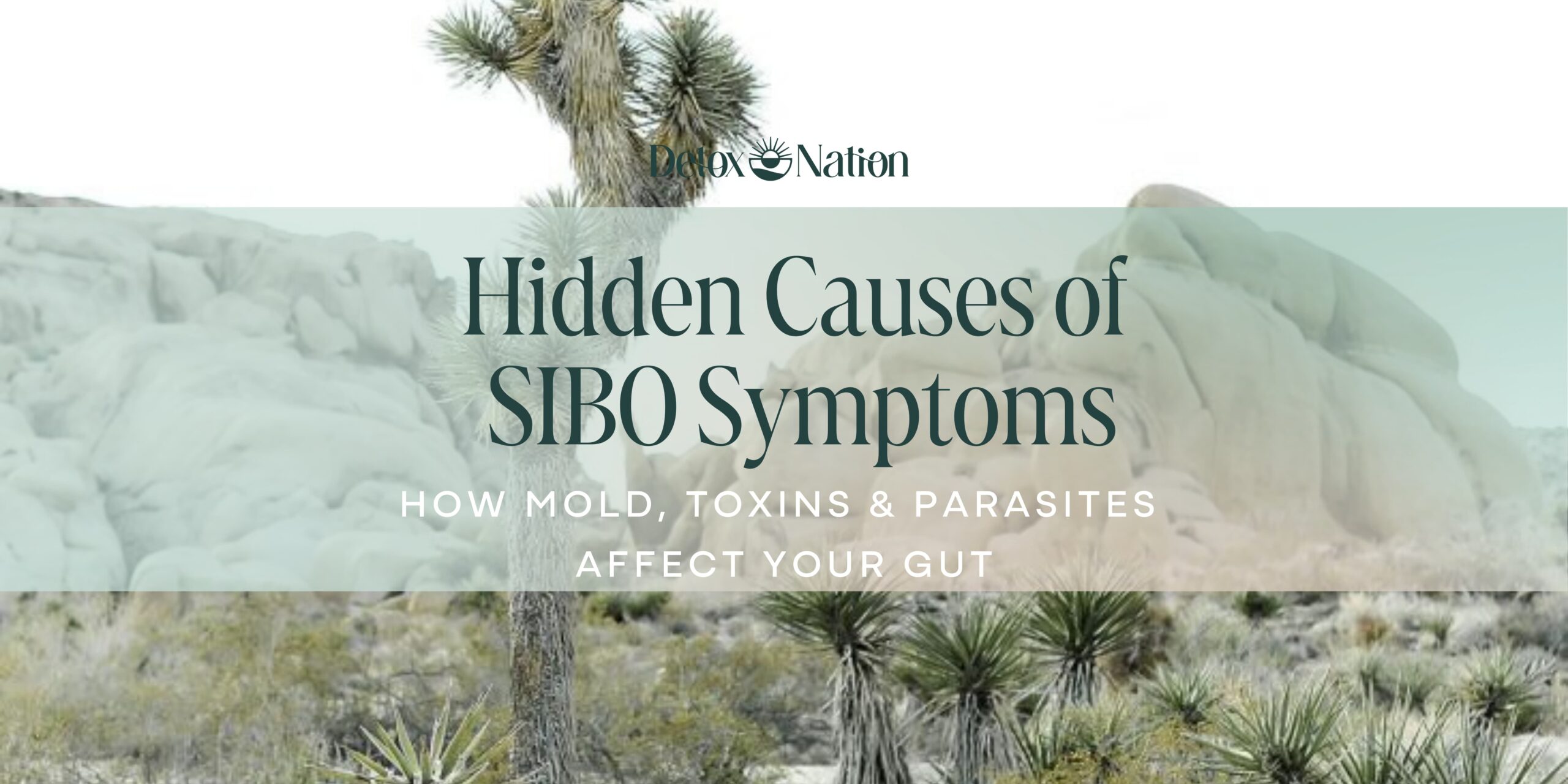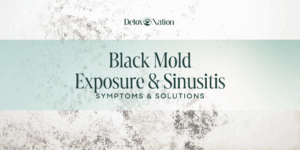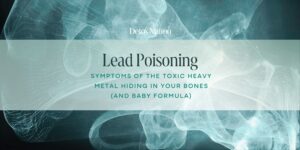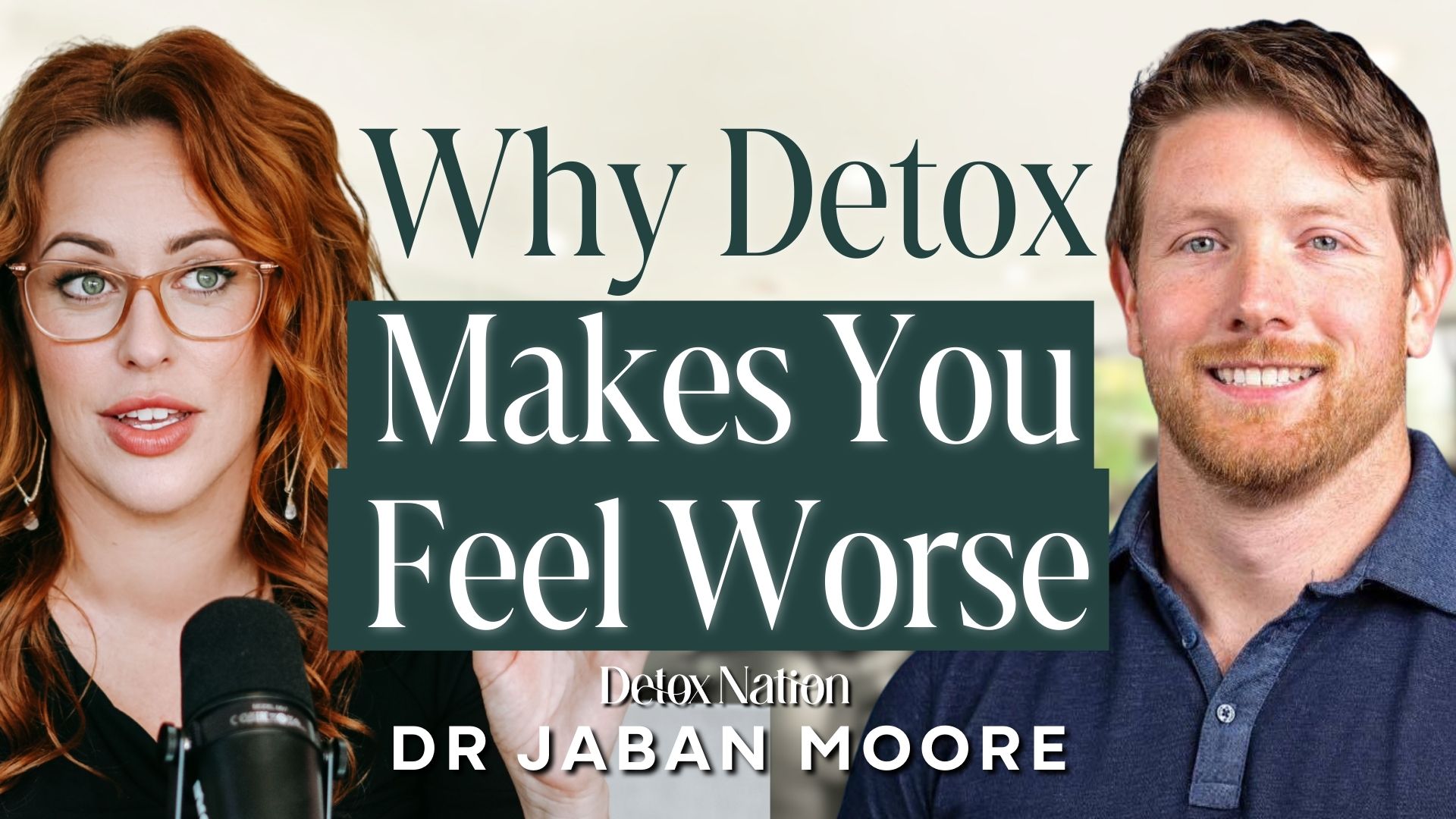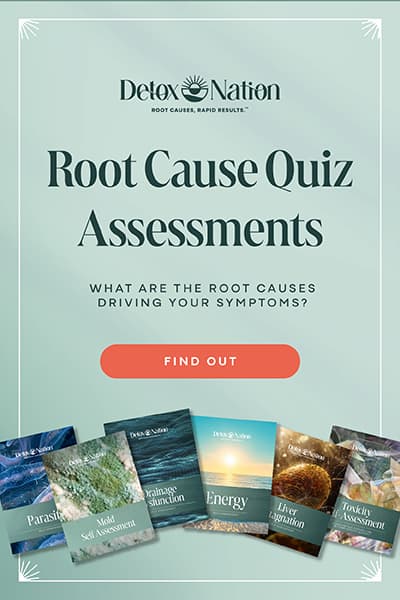SIBO (Small Intestinal Bacterial Overgrowth) might be the hidden culprit behind your bloating, gas, and digestive symptoms, but it’s driven by deeper issues. Understanding the real root causes, such as mold, toxins, and parasites, is essential for true healing.
SIBO is more than just an upset stomach.
It happens when there’s an overgrowth of bacteria in your small intestine, interfering with digestion and nutrient absorption and causing gastrointestinal symptoms.
SIBO can lead to more serious issues such as B-12 deficiency, which affects your energy levels and even your nervous system (1).
Identifying the root causes can be key to tackling your symptoms and feeling better.
Recovering from SIBO means understanding root causes, which you may have heard can include anything from poor gut motility to excessive antibiotic use.
But did you know that mold, toxins, and parasites can be the real root causes of the factors that drive SIBO?
Key Takeaways
- SIBO causes digestive issues like bloating and gas.
- It’s crucial to identify the root causes for proper treatment for SIBO.
- SIBO may also be caused by mold, parasites, and industrial chemical exposure.
- SIBO is fixable.
Before We Dive In
I just have to get this off my chest.
One of the biggest mistakes I see people make regarding their health is not understanding what is driving their symptoms, reactions, and even their responses to treatment.
It’s not your fault.
Mainstream allopathic medicine has taught us to label our many symptoms as diagnoses.
A symptom is something you experience – it’s what is happening in your body.
Some examples of a range of symptoms include things like constipation, diarrhea, brain fog, pain, nausea, headache, anxiety, bloating, and more.
A diagnosis should address why the symptom is occurring.
We’ve been trained that diagnoses would be things like irritable bowel syndrome, leaky gut syndrome, fibromyalgia, autoimmune disorders, cancer, hypothyroidism, and so forth.
In my opinion, many of these “diagnoses” are actually symptoms.
They describe what has happened, but not why or how.
This is a problem because once the diagnosis has been given, the investigation and exploration stop.
Treatment of the persistent symptoms is provided instead of treatment of the underlying cause.
How can a health issue improve or heal if we never address it?
Let me put it another way.
If all you do is chase the symptoms, you’ll never get to the root cause, and you’ll never heal.
Have you ever wondered why there are so many “incurable” health issues?
Is it possible they’re “incurable” because we haven’t identified the underlying causes?
Once you’re aware of this systemic mislabeling, it becomes much easier to understand what is driving your health issues and to keep looking until you find the underlying causes. (Now you know!)
SIBO is a perfect example.
Small Bowel Bacterial Overgrowth describes what is happening in your body, but not why or how.
Let’s look at the “mainstream” understanding of SIBO and its causes – and then flip the script to see those as symptoms, allowing us to uncover the underlying root causes of SIBO.
Healing from SIBO starts with you, but you’re not alone.
Take our mold assessment to see if mold toxicity may be at the root of your SIBO symptoms.
Take My Mold Assessment NowUnderstanding SIBO and SIBO Symptoms from the Mainstream Perspective
SIBO causes various digestive problems and discomfort. It’s helpful to know what SIBO is, what can make you more likely to get it, the symptoms to watch out for, and how to diagnose SIBO.
What Is SIBO?
SIBO stands for Small Intestinal Bacterial Overgrowth.
SIBO occurs when there are differences in the quantity, quality, and location of bacteria in the small intestine (2).
Normally, this part of your digestive system has fewer bacteria compared to the large intestine.
When too many bacteria grow here, it can interfere with the digestion of food and absorption of nutrients.
The excess bacteria allow partially digested food to ferment in your gut.
This can make you feel so nauseous that you don’t want to eat like your abdomen has been pumped up with air, and your intestines are staging a revolt.
It can even lead to malabsorption conditions, a common complication of SIBO, which might result in malnutrition and weight loss (3).
Predisposing Factors of Small Intestinal Bacterial Overgrowth
Certain factors can make you more likely to develop SIBO. These include:
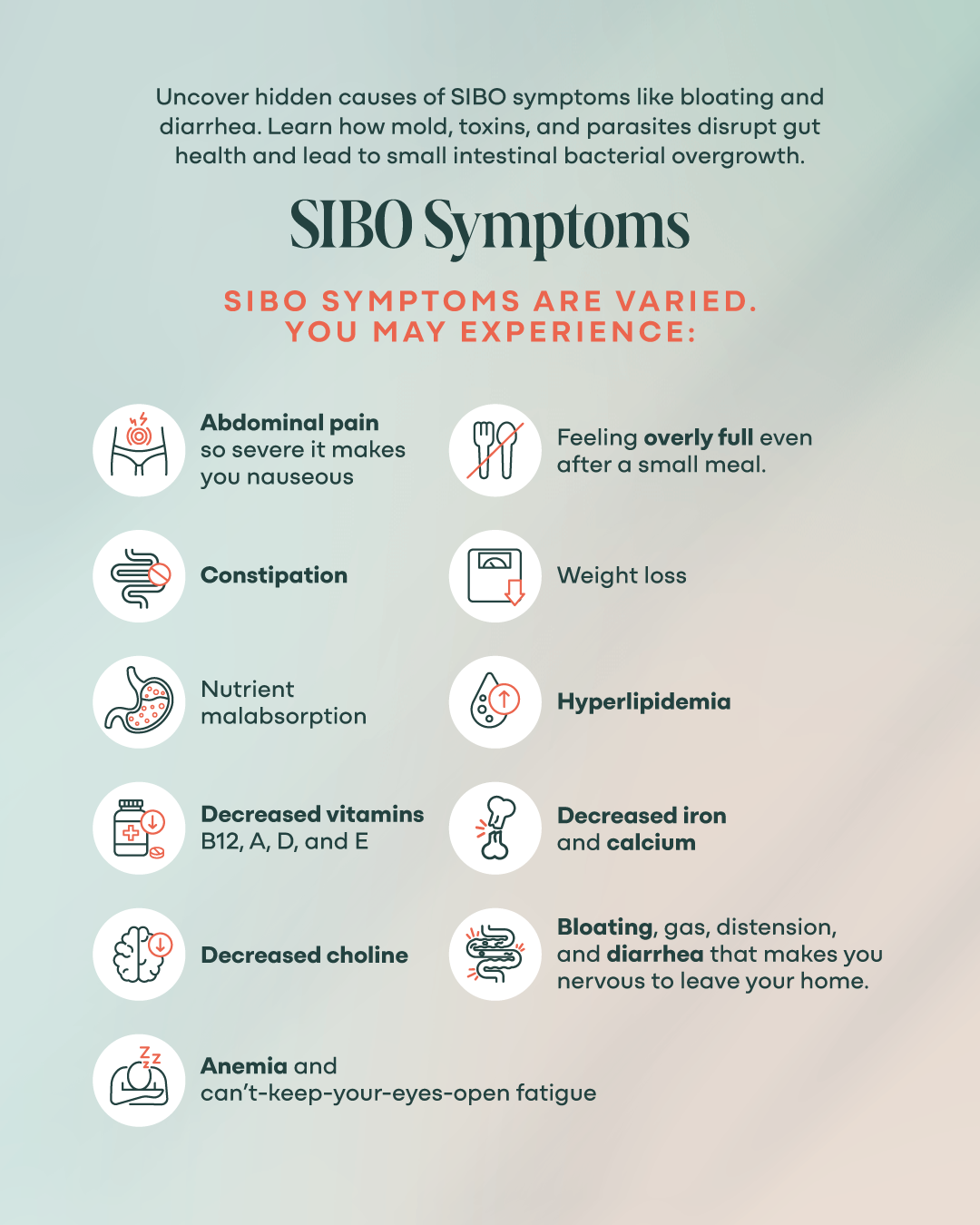
Common Symptoms of SIBO
SIBO symptoms are varied. You may experience:
- Bloating, gas, distension, and diarrhea make you nervous to leave your home.
- Abdominal pain (6) so severe it makes you nauseous
- Constipation
- Feeling overly full even after a small meal.
- Malabsorption (7)
- Anemia and can’t-keep-your-eyes-open fatigue (8)
- Weight loss (9)
- Hyperlipidemia (10)
- Decreased vitamins B12, A, D, and E (11)
- Decreased iron and calcium (12)
- Decreased choline (13)
Conventional SIBO Diagnosis
The most common way to diagnose SIBO is the hydrogen breath test, which indirectly tests for SIBO by measuring the amount of hydrogen and methane gas produced by bacteria in your intestines.
This test involves drinking a sugar solution and then breathing it into a bag at regular intervals. High levels of these gases indicate bacterial overgrowth.
Other diagnostic methods may include tests for nutritional deficiencies and imaging studies to examine the structure of your intestines.
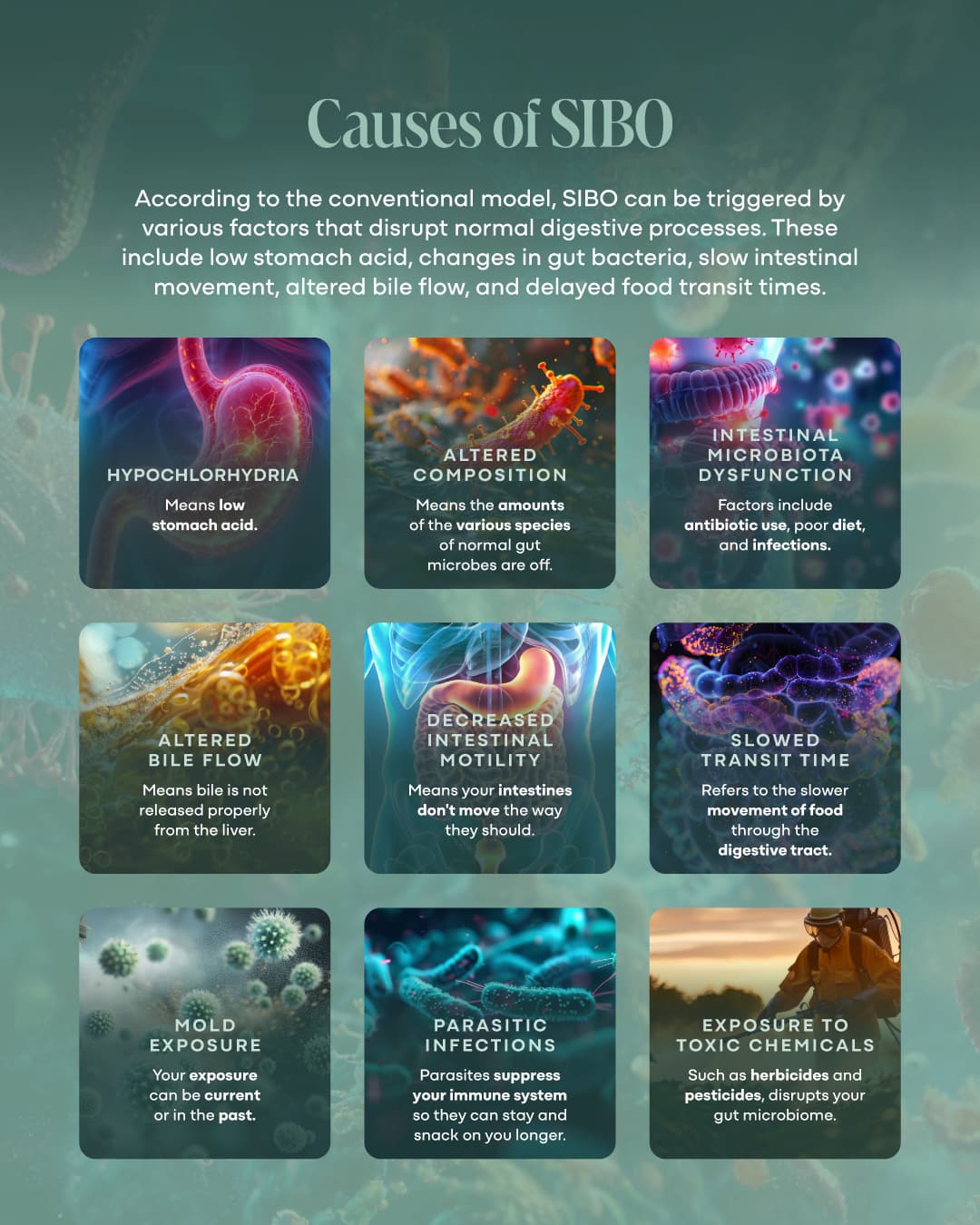
Digging Deeper: Root Causes of SIBO
Your internal terrain is the environment within your body and includes the coordinated functioning of all your systems.
A healthy internal terrain is protective while a disrupted internal terrain makes you vulnerable to infection, disease, and poor health.
Mold, parasites, industrial chemicals, heavy metals, EMFs, plastics, and more destroy your internal terrain.
The good news is that they are the root causes of many chronic conditions.
Wait a minute.
Why exactly is that good news?
Because toxic exposures like these are fixable.
When you remove the toxic exposure, you can then get to the root causes.
This allows your body to do its job and heal.
How could exposure to mold, parasites, or industrial chemicals cause SIBO? Let’s look at that next.

Mold Toxicity
Mold exposure can be an underlying cause of SIBO.
Your exposure can be current or in the past (23). (Lucky us, it’s cumulative.)
You can be exposed in an old building, in new construction, or (in my case) in your car. Remember time spent in every environment counts: work, school, vacation spots. The mold may not be in your home!
Mold produces mycotoxins, which impair and evade your immune system.
Mycotoxins severely damage your digestive system in several ways (24).
They irritate your digestive lining, decrease mucus production, and cause significant inflammation (25).
Mycotoxins decrease your stomach acid, which disrupts your ability to obtain nutrients from your foods and changes the pH of your digestive system.
It becomes harder for your system to kill bacteria and other invaders because the stomach acid is less acidic.
The composition of your microbiome changes – you have fewer protective “good” bacteria, and more “bad” bacteria pumping out pro-inflammatory substances.
The integrity of the intestinal wall decreases. Ultimately, the intestines become permeable, allowing waste material to return to the bloodstream instead of being eliminated.
Your “leaky gut” and new internal terrain promote infection and poor health.
Mycotoxins stress your liver and cause alterations in bile production and flow.
Symptoms of mycotoxin illness include digestive issues, immune system dysregulation (26), cognitive and neurological deficits (27), mitochondrial and endocrine dysfunction (28), and respiratory issues (coughing, sneezing, congestion, burning eyes, etc.) (29).
In the case of SIBO, mycotoxin exposure creates the perfect environment for bacterial overgrowth in the small intestine.
SIBO can be a symptom of mold toxicity. Mold toxicity can be a root cause of SIBO.
Parasitic Infection
Parasitic infections can also lead to SIBO.
You’re exposed to parasites by eating raw foods (even fruits and vegetables), travel, person-to-person contact, and contaminated food and water (30).
Parasites are experts at hiding from and tricking your immune system (31).
They can change their shape and function depending on their environment – this is called pleomorphism (32).
Once inside your body, they suppress your immune system so they can stay and snack on you longer (33).
They cause your body to secrete less mucus, making it easier to attach to your digestive lining and steal your nutrients.
Parasites like Giardia or Blastocystis hominis can interfere with normal digestive processes and cause bacterial imbalances and inflammation (34).
Parasites can even mimic your own cells, confusing your immune system.
As the infection continues, parasites can impair your gut motility, allowing food to stay in your system and ferment.
The parasites stress your liver (35), promote stone formation, and change the production and flow of bile (36).
Sound familiar?
SIBO can be a symptom of parasitic infection. Parasitic infection can be a root cause of SIBO.
Toxic Chemicals
Exposure to toxic chemicals, such as herbicides and pesticides, disrupts your gut microbiome (37). (I’m looking at you, glyphosate!)
These substances impact the health of the beneficial bacteria in your intestines, as well as the composition of your microbiome.
Chemicals found in or on non-organic foods can be especially problematic.
As the microbiome changes, we also see changes in mucus production, bile production, inflammation, intestinal motility, and more (38).
All making it easier for bacteria to overgrow in the small intestine.
These industrial chemicals can also increase estrogen production, leaving you vulnerable to parasitic infection (39).
(And we just saw how parasites impact the gut.)
Are you seeing the pattern?
SIBO can be a symptom of toxic exposure. Toxic exposure can be a root cause of SIBO.
Toxins are a primary driver of disease and poor health in the general population (40).
Unfortunately, most people in this country have multiple exposures to multiple toxins that disrupt their internal terrain and make them the perfect host for invaders.
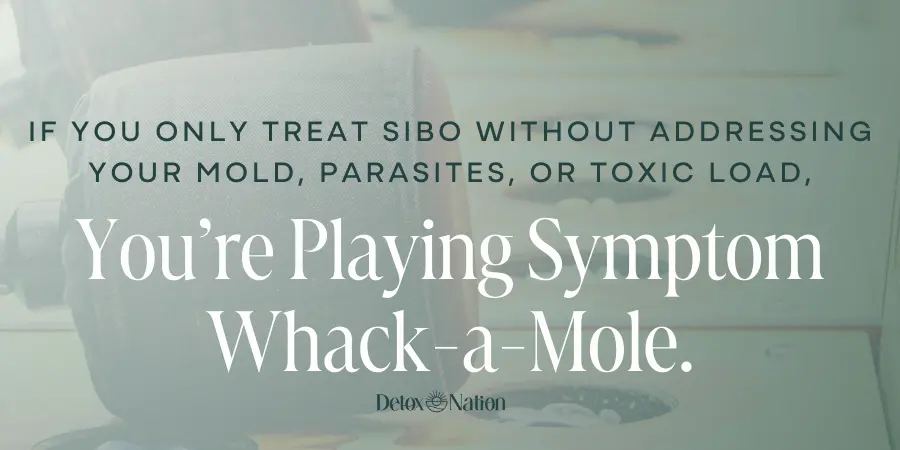
The Mainstream Perspective on the “Causes” of SIBO
According to the conventional model, SIBO can be triggered by various factors that disrupt normal digestive processes. These include low stomach acid, changes in gut bacteria, slow intestinal movement, altered bile flow, and delayed food transit times. (14)
Here, we’ll look at each “cause” briefly, and then (in the next section) we’ll discuss how these “causes” can actually be symptoms of bigger issues like mold, chemicals, and parasites.
Hypochlorhydria
Hypochlorhydria means low stomach acid.
Stomach acid is crucial for digestion and killing harmful bacteria and other pathogens.
When acid levels are low, bacteria that should be killed can survive and multiply in the small intestine.
This excess bacteria in the small intestine leads to symptoms like gas and abdominal bloating that make patients with SIBO feel like they need to wear pants several sizes larger than normal.
Common causes for hypochlorhydria include age, chronic use of acid-reducing medication (15), and Helicobacter pylori infection.
Altered Composition or Function of Intestinal Microbiota
Your gut contains trillions of bacteria that help with digestion and overall health.
Altered composition means the amounts of the various species of normal gut microbes are off.
For example, people with SIBO often have an increase in the number of Streptococcus bacteria in their gut and a decrease in the Bacteroides bacteria (16).
Intestinal microbiota dysfunction happens when the collective bacteria in the gut are not behaving normally.
(There are more microbial cells in your body than human cells. When the microbes try to take over, health chaos ensues!)
Some factors that cause this include antibiotic use, poor diet, and infections.
This imbalance can harm digestion and nutrient absorption, leading to symptoms like diarrhea and malnutrition.
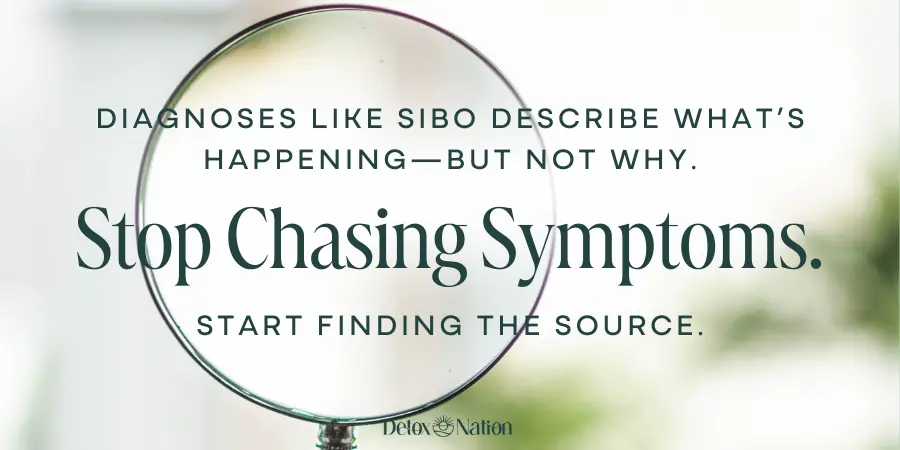
Altered Bile Flow
Bile helps digest fats and kills bacteria. (It has many other amazing superpowers, but that’s an article for another time!)
As the bacteria in the gut increase, bile breakdown accelerates (17).
This leads to decreased fat absorption and lowered levels of fat-soluble vitamins, especially Vitamin D (18).
The associated nutritional deficiencies can impair liver function, which reduces bile production and flow (19).
Insufficient bile disrupts the gut environment, encouraging bacterial overgrowth in the small intestine.
Altered bile flow means bile is not released properly from the liver, which affects fat digestion and allows bacteria to multiply.
Causes of altered bile flow include gallbladder removal, liver disease, and certain medications.

Decreased Intestinal Motility
Your intestines are supposed to move in coordinated waves of contractions to propel food through your system.
This is called “peristalsis.” (It makes me grin to think of the cells in my body “doing the wave.”)
Decreased intestinal motility means your intestines don’t move the way they should.
This slow movement can cause bacterial overgrowth because food stays in the intestine too long.
Reasons for decreased motility include nerve damage, diabetes, and certain medications.
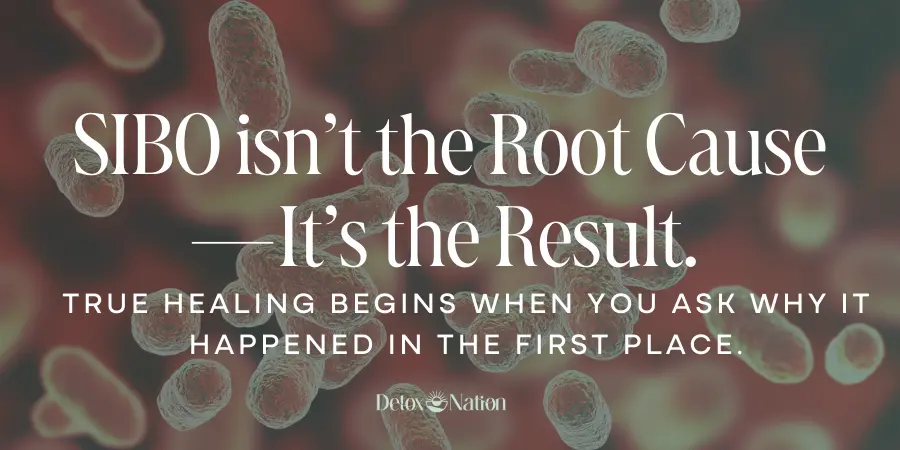
Slowed Transit Time
Often related to decreased intestinal motility, slowed transit time refers to the slower movement of food through the digestive tract.
When transit time is slow, it creates a favorable environment for bacteria to grow excessively (20).
With bacterial overgrowth, food, and waste material linger too long in the gut (21).
Factors that contribute to slowed transit time include a diet low in fiber, dehydration, and a sedentary lifestyle.
As you can see, each of the mainstream “causes” of SIBO has causes of its own.
This is because SIBO develops secondary to other issues (22).
So, what do you think?
Are hypochlorhydria, microbiome changes, and changes in motility and transit time true causes of SIBO, or are they symptoms of a bigger issue?
Let’s dig deeper and look at the root causes of the root causes of SIBO.
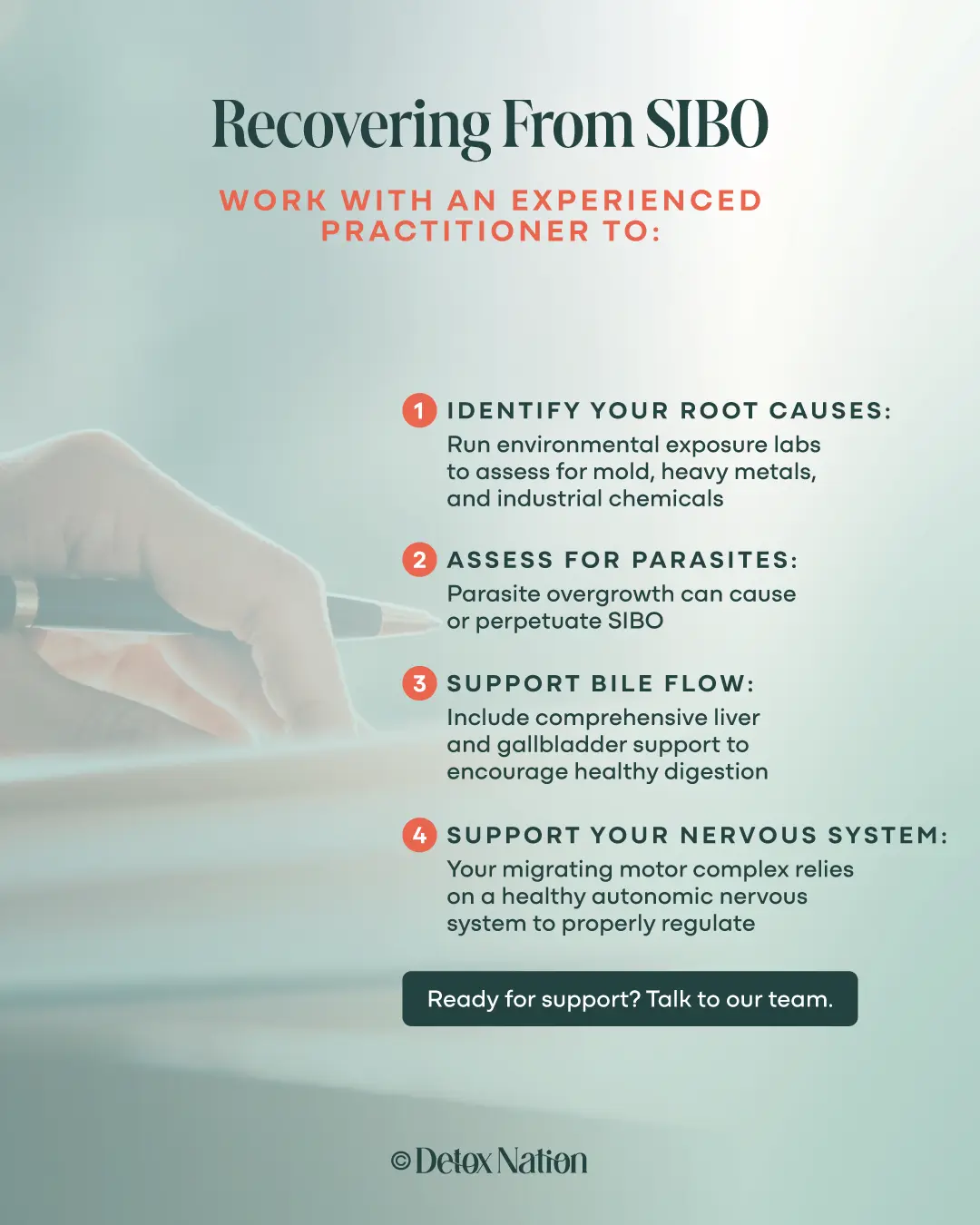
Recovering From SIBO
To recover from SIBO, you must address your internal terrain and the external environmental factors that make you the perfect host for bacterial overgrowth.
You can heal from SIBO, but no one can do it for you.
Action Steps
Taking action to address SIBO involves several important steps.
Identify the Cause
Work with an experienced practitioner to find out what’s causing your SIBO. This might include running labs and looking at your health history.
Reduce Environmental Exposures
- Mold:
- Regularly clean and dry areas prone to moisture, like basements and bathrooms.
- Consider professional mold testing and remediation if you encounter persistent mold issues.
- Parasites:
- Consume fully cooked food.
- Avoid tap water, even at home.
- WASH YOUR HANDS!
- Industrial Chemicals:
- Opt for organic produce when possible to reduce exposure to these toxins.
- Wash all fruits and vegetables.
- Understand hidden sources of exposure. For example, glyphosate is sprayed on organic oat crops as a desiccant, so it’s not required to be disclosed.
- Avoid chemicals in household products and choose natural alternatives instead.
Lifestyle Adjustments
Your daily habits play a big role in SIBO.
Eating a lot of processed foods, high in refined sugars and low in fiber, can disrupt gut health, perpetuating bacterial overgrowth.
Unhealthy lifestyle choices, like excessive alcohol consumption and smoking, also contribute.
Sedentary lifestyles reduce gut motility, making it harder for your intestines to move food and bacteria properly.
Staying active is important to keep your digestive system moving smoothly.
Reducing stress, getting enough sleep, and regular physical activity can all support gut health.
Conclusion
Once you know where the issues in your internal terrain and external environment are, you can take small, consistent steps toward living the life you deserve to live.
And I’ll be right there, cheering you on!

Frequently Asked Questions About Signs and Symptoms of SIBO and Its Causes
Small intestine bacterial overgrowth (SIBO) can be confusing. It’s linked to various health issues and symptoms. Here are some common questions people have about SIBO to help you understand it better.
How is mold toxicity connected to SIBO?
Mold exposure can compromise your gut health. When your body is exposed to mold toxins, it can weaken your immune system. This makes it easier for harmful bacteria to grow in your small intestine. This bacterial overgrowth may cause SIBO and its symptoms.
What signs should I look out for that might indicate I have SIBO?
Signs of SIBO include bloating, gas, and stomach cramps. You might also notice diarrhea or constipation. In some cases, people experience unintentional weight loss and nutrient deficiencies.
What are the underlying reasons for developing SIBO?
Several risk factors can contribute to being diagnosed with SIBO. These include a weak immune system, previous surgeries, and chronic conditions like diabetes. Sluggish digestion and the use of certain medications can also create a breeding ground for bad bacteria in your gut. Root causes of SIBO include mold toxicity, parasitic infection, and industrial chemical exposure.
How is SIBO related to parasites?
Parasites can disrupt your gut’s natural balance. When parasites invade your digestive system, they can damage your gut lining and impair digestion. This disruption provides an environment where harmful bacteria can thrive, leading to conditions like SIBO.
P.S. — If the insights in this blog resonated with you, it’s time to take action. Hidden toxins like mold, parasites, heavy metals, and chemicals can silently impact your health—but there is a path to comprehensive healing. Join the Healing Labs program: a transformative 3-month journey to pinpoint hidden toxins, create a personalized detox plan, and get expert one-on-one support every step of the way. Book your free call today by following the link below and take the first step toward a healthier, more vibrant you. Let’s uncover what’s holding you back and create a clear path to healing together.
Healing from SIBO starts with you, but you’re not alone.
Take our mold assessment to see if mold toxicity may be at the root of your SIBO symptoms.
Take My Mold Assessment Now
